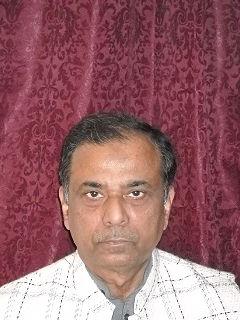- Tanwir Phool
-
Tanwir Phool 
Born Tanwiruddin Ahmad Siddiqui
1948
Muzaffarpur, IndiaLanguage Urdu, English Nationality Pakistani Education M.A. Alma mater University of Karachi Period contemporary Genres Ghazal Notable award(s) Presidential Award from the Government of Pakistan Tanwir Phool (Urdu: تنور پھول , or Tanwiruddin Ahmad Phool (Urdu: تنور الدین احمد پھول ) (born 1948 in Muzaffarpur, India) is the pen name of Tanwiruddin Ahmad Siddiqui, a Pakistani author and poet, writing in Urdu and English.
Contents
Education and career
He received his education in Karachi, Pakistan. He studied at the D. J. Science College and Urdu College, and graduated in 1971 from the University of Karachi. In 1973 he obtained a Masters Degree in Islamic history from the university. He worked at the State Bank of Pakistan from 1970 to 1997, until retirement.
Works
Phool has written poems in the traditional Urdu forms of the Ghazal, Rubaa'ee, and Dohay, as well as the traditional Japanese form of Haiku.
Anwaar-e-Hira
Anwaar-e-Hira is a collection of religious poems by Tanwir Phool. It was published in 1997.[1]
Some of the forms used are Musaddases, with every stanza having 6 lines, and Mukhammases, with every stanza having 5 lines. It was published by the Hira Foundation, Pakistan. The introduction, which includes biographical information on the author, was written by Professor Najmul Hoda of India.
Honoraria
- Presidential Award for the Best National Poetry Book of 2005 from the Ministry of Education, Government of Pakistan
- National Book Foundation Awards for 3 years(from 2001 to 2003) from the Government of Pakistan
- Government of Sindh Award in 2005 for contributions to children's literature
- Golden Jubilee Award from the Hira Foundation, Karachi, Pakistan, for children's literature
- Commendation Certificate for contributions to literature & poetry, from the Faran Writers Guild, Pakistan
- Title of "Qamar-ush-Shu'araa" (Moon among the poets), given by the Shu'oor Academy, for poetic translation of the Qur'an
- Title of "Aftab-e-Sipahr-e-Sukhan" (Sun of the Sky of Poetry) given by the head of the departments of Urdu, Arabic & Persian at Madras & Bihar Universities, India
Bibliography
- Gulshan-e-Sukhan (Garden of Poetry) (1970)
- Khushbu Bheeni Bheeni (The Mild Scent) (1983)
- Tanweer-e-Hira (Refulgence of Hira Cave) (part 1) (1994)
- Anwaar-e-Hira (Brightness of Hira Cave) (1997)
- Rashk-e-Bagh-e-Iram (Envy of Paradise Garden) (1997)
- Tanweer-e-Hira (Refulgence of Hira Cave) (part 2) (1999)
- Dhuwan Dhuwan Chehray (The Sooty Faces) (1999)[1]
- Zaboor-e-Sukhan(the Psalms of Poetry) (2002)[2]
- Qindeel-e-Hira (The Lamp of Hira Cave) (2003)
- Chiryaa,Titli,Phool(Sparrow,butterfly,flowers)(poems for children) (2004)
- Naghmat-e-Pakistan (The Melodies of Pakistan) (2005)
- Arham-ur-Raahimeen (2005)[3] & [4]
References
- ^ Tanwir Phool (1997), Anwaar-e-Hira, Karachi, Pakistan: Hira Foundation
- "Complete Urdu Encyclopedia" (Volume 3) ISBN 9693100115 , pages 83 & 84, compiled by C. Smith Junior & Justice S.A, Rehman, published by Sheikh Ghulam Ali & Sons, Lahore, Pakistan)S.No.44 at [5]
- "Ahl-e-Qalam Directory" ISBN 9789694721531 , published in 2008 by Pakistan Academy of Letters,Ministry of Education,Government of Pakistan,Islamabad. (page 71) www.academy.gov.pk
- Daily "Kaleem", Sukkur, Pakistan, 11 March 2007 [6]
- Circular No.5206.HBA-7, 31 May 2006 [7] issued by the Ministry of Education,Government of Pakistan granting the Presidential Award
- Daily "Qaumi Akhbar" Karachi, Pakistan, 20 September 2005 [8]. Daily "Qaumi Akhbar", Member, All Pakistan Newspapers Society, Karachi
- Daily "Jang", Karachi, 20 September 2005[www.jang.com.pk]
- Daily "Daily News", Karachi, 22 July 2006.[www.jang.com.pk]
- Article by Professor Afaq Siddiqui, daily "Express", Karachi,19 August 2001(S.No.1 at [9])
- "Sukhanwar", volume 5 , pages 134 to 139, Sultana Meher [10]
- "Poets of Pakistan" volume 2, Syed Muhammad Qasim, pages 136 & 137, Hira Foundation, Karachi(S.No.3 at [11])
- Quarterly "Rang-e-Adab"(Naat Number), Rang-e-Adab Publications, Karachi(S.Nos.45 & 46 at [12])
- Quarterly "Rang-e-Adab"(Shumara No.8), Rang-e-Adab Publications, Karachi(S.No.47 at [13])
- Sawera Urdu Book ,pages 10 & 11, published by Babar Book Depot, Urdu Bazaar, Lahore
- Review by Professor Afaq Siddiqui (in Urdu) in "Hamdard Sehat" of Hakim Said, March, 2000 (4th image at [14])
- Urdu article by Dr.Jamil Azimabadi,published in "Adab-e-Mualla" [15]
- Introduction of "Anwaar-e-Hira" at page No.71 of "Ahl-e-Qalam Directory", published in 2008 by Pakistan Academy of Letters, Government of Pakistan, Islamabad
External links
Categories:- 1948 births
- Living people
- Muhajir people
- Pakistani poets
- Urdu poets
Wikimedia Foundation. 2010.
